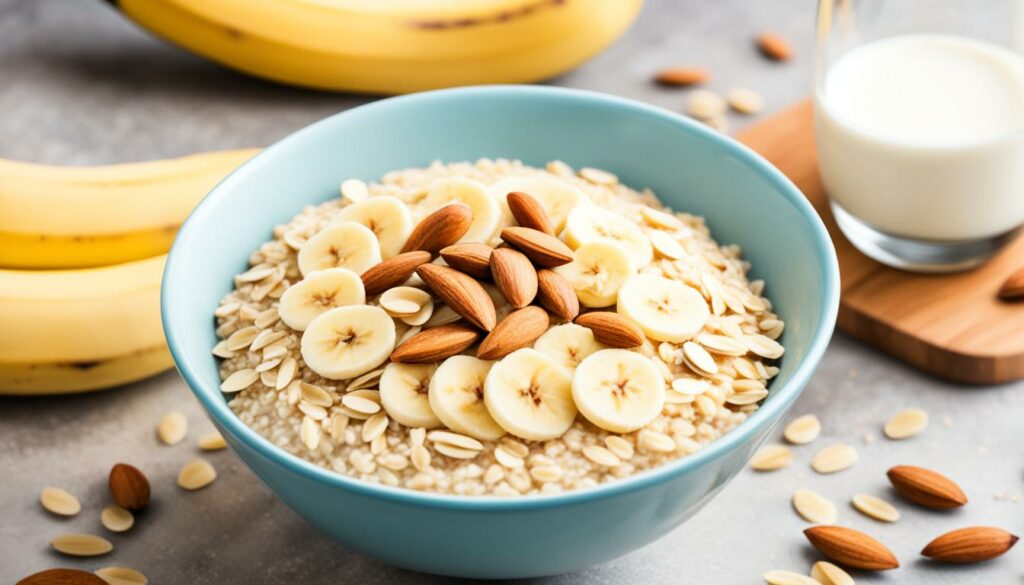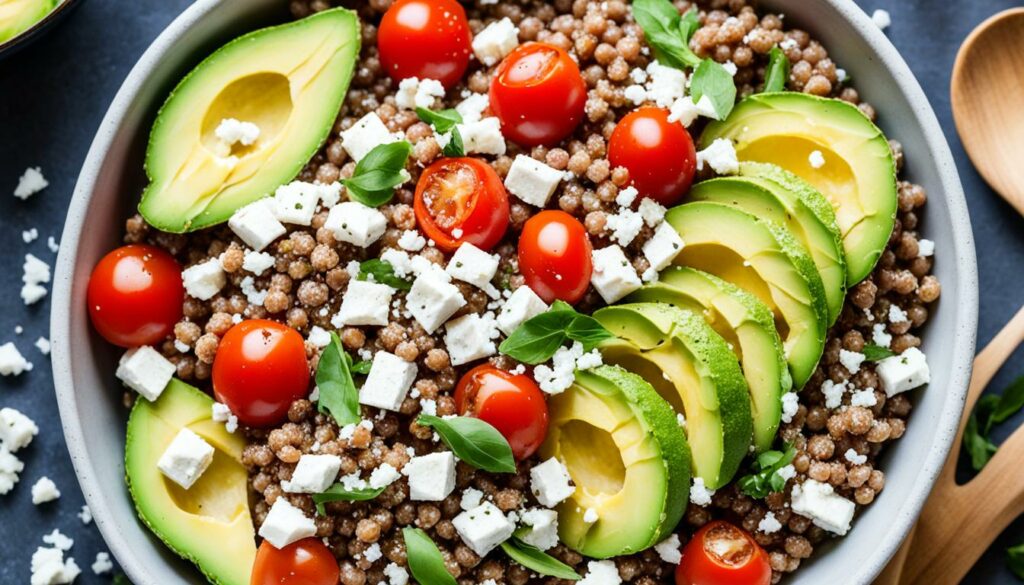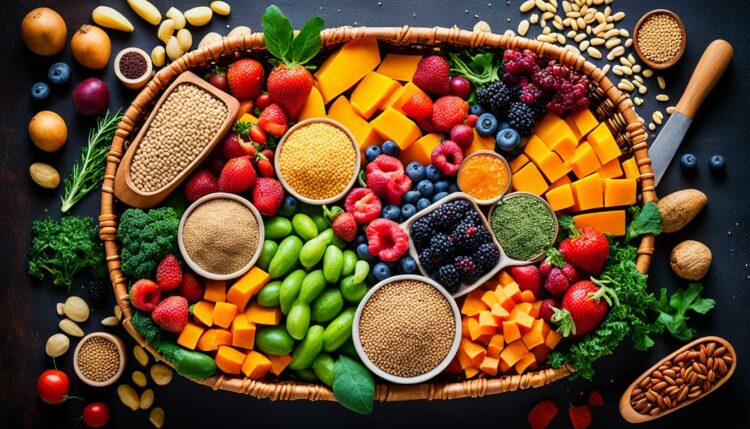Carbohydrates have gotten a bad reputation, but it’s important to distinguish between processed carbs and nutrient-dense, fiber-rich foods.
Low carb diets may be beneficial for some, but there’s no need to avoid all high carb foods. Here are 12 healthy carbohydrate foods that provide essential nutrients and can support a healthy diet.
Key Takeaways:
- Include healthy carbohydrate foods in your diet for essential nutrients.
- Not all high carb foods are unhealthy.
- Fiber-rich carbohydrates are beneficial for digestion.
- Choose whole grain foods for better health.
- Nutritious carbs can support heart health and weight management.
Quinoa – A Nutritious Pseudocereal
Quinoa, a pseudocereal, is a highly nutritious grain alternative that offers a range of health benefits. Despite being categorized as a high-carb food, quinoa also provides a significant amount of protein and fiber, making it an excellent addition to a balanced diet.
Rich in minerals and plant compounds, quinoa has been linked to improved blood sugar management and heart health. Its complex carbohydrates are slowly digested, resulting in a gradual release of glucose into the bloodstream, which helps stabilize blood sugar levels.
Moreover, quinoa’s high fiber content contributes to satiety, keeping you feeling fuller for longer and potentially aiding weight management. It also promotes a healthy digestive system and supports gut health.
The Nutritional Profile of Quinoa
Quinoa is packed with essential nutrients:
| Nutrient | Amount per 1 cup (185g) |
|---|---|
| Protein | 8 grams |
| Fiber | 5 grams |
| Fat | 3 grams |
| Iron | 15% of the Daily Value |
| Magnesium | 30% of the Daily Value |
| Phosphorus | 28% of the Daily Value |
| Manganese | 58% of the Daily Value |
With its impressive nutritional profile, quinoa is a versatile grain that can complement a wide range of dishes. It can be used as a base for salads, a filling for stuffed vegetables, or a side dish alongside meat, fish, or other plant-based proteins.
“Quinoa is not only a high carb food but also a great source of protein and fiber, supporting blood sugar management and heart health.”
Incorporating quinoa into your diet can provide numerous health benefits while adding variety to your meals. Whether you’re seeking a gluten-free grain alternative or looking to boost your protein and fiber intake, quinoa is a nutritious choice that can contribute to overall wellbeing.
Oats – A Healthy Whole Grain
Oats are a nutritious whole grain that provides a good source of complex carbohydrates, fiber, and protein. They make for an excellent choice when it comes to incorporating high carb foods into your diet while also promoting heart health and blood sugar management.
One of the key components that sets oats apart is their high fiber content. They contain a specific type of fiber known as oat beta glucan, which has been shown to have numerous health benefits.
Oat beta glucan helps lower cholesterol levels by reducing the absorption of cholesterol into the bloodstream, thus improving heart health.
In addition to their heart-healthy attributes, oats also have a low glycemic index. This means that they are digested and absorbed more slowly, resulting in a slower release of glucose into the bloodstream. As a result, oats can help regulate blood sugar levels and provide sustained energy throughout the day.
Furthermore, oats are filling and can support healthy weight management. The combination of fiber and protein in oats helps to promote feelings of fullness and can aid in controlling appetite. This makes them a great option for individuals looking to maintain or lose weight.
Whether you enjoy them as a warm bowl of oatmeal, in baked goods, or as a crunchy topping for yogurt, oats are a versatile and nutritious ingredient that can easily be incorporated into your daily meals.
| Nutrition Information | Per 100g |
|---|---|
| Calories | 389 |
| Carbohydrates | 68g |
| Protein | 14g |
| Fiber | 10g |
How to Incorporate Oats Into Your Diet
- Start your day with a hearty bowl of oatmeal topped with fresh fruits and nuts.
- Add oats to smoothies for an extra dose of fiber and nutrients.
- Use oats as a flour substitute in baking recipes for a healthier twist.
- Sprinkle oats on top of your favorite yogurt or cottage cheese for added texture and nutrition.
- Create homemade granola bars or energy balls using oats as a key ingredient.

Buckwheat – A Gluten-Free Pseudocereal
Buckwheat is a gluten-free pseudocereal that packs a nutritional punch. Despite its name, buckwheat is not related to wheat and is an excellent choice for those following a gluten-free diet. This versatile grain substitute is not only high in carbs but also provides a good amount of protein and fiber.
An important aspect of buckwheat is its role in promoting heart health. It has been associated with lower levels of LDL cholesterol, the “bad” cholesterol, and improved overall heart health.
This is due to the presence of bioactive compounds such as rutin, which acts as an antioxidant and helps prevent the formation of blood clots.
Buckwheat is also beneficial for blood sugar regulation. Its high fiber content slows down the digestion process, preventing rapid spikes in blood sugar levels and promoting better glycemic control. This makes it a suitable option for individuals with diabetes or those looking to manage their blood sugar levels.
Not only is buckwheat nutritious, but it also offers a wide range of minerals and antioxidants. It contains magnesium, potassium, and the B-vitamin group, which are essential for maintaining optimal bodily functions.
The presence of antioxidants helps protect against oxidative stress and inflammation, supporting overall health and well-being.
To incorporate buckwheat into your diet, you can try using buckwheat flour in baking or cooking. It can be used as a replacement for wheat flour and adds a nutty flavor to dishes. Buckwheat groats, the grain-like seeds, can be cooked as a side dish or added to salads for an extra nutritional boost.
| Nutrient | Amount per 100g |
|---|---|
| Carbohydrates | 71g |
| Protein | 13g |
| Fiber | 10g |
| Fat | 3g |
Note: Nutrient values may vary slightly depending on the brand and method of preparation.

Bananas – A Nutrient-Rich Fruit
Bananas are a popular fruit known for their delicious taste and impressive nutrient profile. While they are often associated with their high carbohydrate content, it’s important to note that they also offer a wide range of health benefits.
One medium-sized banana contains approximately 27 grams of carbohydrates. These carbs primarily come in the form of starches and sugars, making bananas a high carb fruit. However, it’s worth mentioning that the natural sugars in bananas are accompanied by valuable nutrients.
One notable nutrient found in bananas is potassium. A medium-sized banana provides around 400-450 milligrams of potassium, which is essential for maintaining proper bodily functions. Potassium plays a crucial role in heart health, muscle contractions, and fluid balance within the body.
In addition to potassium, bananas are also rich in vitamins B6 and C. Vitamin B6 is involved in energy metabolism and the synthesis of neurotransmitters, while vitamin C acts as an antioxidant and supports immune function.
Moreover, bananas can have a positive impact on digestive health. They contain a type of fiber called pectin, which acts as a prebiotic, supporting the growth of beneficial gut bacteria. Additionally, bananas contain resistant starch, a unique form of starch that functions as a dietary fiber and promotes digestive regularity.
Health Benefits of Bananas:
- Rich in potassium, supporting heart health and fluid balance
- High in vitamins B6 and C, boosting energy and immunity
- Contains pectin, promoting digestive health
- Provides resistant starch, supporting digestive regularity
It’s important to note that while bananas are a nutritious fruit, they do contain naturally occurring sugars. Therefore, individuals with diabetes or those following a low-carb diet should monitor their portion sizes and consult with a healthcare professional.
| Nutrient | Amount per medium banana (118 grams) |
|---|---|
| Calories | 105 |
| Carbohydrates | 27 grams |
| Potassium | 400-450 milligrams |
| Vitamin B6 | 0.4 mg |
| Vitamin C | 10% of the Daily Value (DV) |
Conclusion
In conclusion, incorporating healthy carbohydrate foods into your diet is essential for a well-rounded and balanced eating plan. Foods such as quinoa, oats, buckwheat, bananas, and a variety of fruits and vegetables offer a wide range of nutrients, fiber, and antioxidants that promote overall health and wellbeing.
These healthy carbs, including low glycemic index carbs and complex carbs found in whole grain foods, provide sustained energy and help regulate blood sugar levels. By choosing fiber-rich carbohydrates and nutritious carbs, you can support heart health, weight loss, and proper digestion.
It is important to focus on consuming healthy starches, such as quinoa and oats, which are slow-release carbs that provide a steady supply of energy throughout the day. Opt for high-fiber carbs like whole grains, fruits, and vegetables to ensure a well-rounded and nutritious diet.
Remember to avoid highly processed and refined carbohydrates, as they can lead to spikes in blood sugar and offer limited nutritional value. By prioritizing healthy carbohydrate options and incorporating them into your meals, you can enjoy the benefits of a balanced diet while maintaining optimal health.
FAQ
Are carbohydrates bad for you?
Carbohydrates have gotten a bad reputation, but it’s important to distinguish between processed carbs and nutrient-dense, fiber-rich foods. Low carb diets may be beneficial for some, but there’s no need to avoid all high carb foods.
Which high carb foods are healthy?
Here are 12 healthy carbohydrate foods that provide essential nutrients and can support a healthy diet.
Is quinoa a healthy carbohydrate?
Quinoa is a pseudocereal that is high in carbs but also provides protein and fiber. It is rich in minerals and plant compounds and has been linked to improved blood sugar management and heart health.
What are the benefits of oats as a high carb food?
Oats are a nutritious whole grain that is high in carbs, fiber, and protein. They contain a specific type of fiber called oat beta glucan, which has been shown to lower cholesterol levels and improve heart health. Oats also have a low glycemic index and can help regulate blood sugar levels.
Is buckwheat a good source of carbohydrates?
Buckwheat is a gluten-free pseudocereal that is high in carbs, protein, and fiber. It is rich in minerals and antioxidants and has been associated with heart health and blood sugar regulation.
Are bananas a healthy high carb fruit?
Bananas are a popular fruit that is high in carbs, particularly in the form of starches and sugars. They are also rich in potassium and vitamins B6 and C. Bananas can help lower blood pressure, improve heart health, and support digestive health due to their content of resistant starch and pectin.
What is the importance of incorporating healthy carbohydrate foods into your diet?
Healthy carbohydrate foods play an important role in a balanced diet. Options like quinoa, oats, buckwheat, bananas, and other fruits and vegetables provide essential nutrients, fiber, and antioxidants. Incorporating these healthy carb foods into your diet can support heart health, blood sugar management, weight loss, and overall wellbeing.
How should I choose my carbohydrate foods?
Remember to focus on whole foods and avoid highly processed and refined carbohydrates to maximize nutritional benefits.




